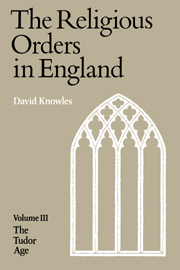Book contents
- Frontmatter
- Contents
- Preface
- List of Abbreviations
- Part One The Tudor Scene
- Part Two The Gathering Storm
- Part Three Suppression and Dissolution
- Chap. XVI Before the Dissolution
- Chap. XVII The end of the Observants
- Chap. XVIII Syon
- Chap. XIX The London Charterhouse and its sister houses
- Chap. XX The economy of the monasteries in 1535
- Chap. XXI Servants, almsgiving and corrodians
- Chap. XXII The visitation of 1535–6
- Chap. XXIII The Act of Suppression and the case for the defence
- Chap. XXIV The dissolution of the lesser houses
- Chap. XXV The Northern Rising
- Chap. XXVI The last phase
- Chap. XXVII The attack on the greater houses
- Chap. XXVIII The suppression of the friars
- Chap. XXIX The cankered hearts
- Chap. XXX The transformation of the buildings
- Chap. XXXI The new cathedrals and colleges
- Chap. XXXII The disposal of the lands
- Chap. XXXIII The treatment of the dispossessed
- Part Four Reaction and Survival
- Appendix I Sir Thomas More's letter ‘to a monk’
- Appendix II Religious houses suppressed by Cardinal Wolsey
- Appendix III The witness of the Carthusians
- Appendix IV Houses with incomes exceeding £1000 in the Valor Ecclesiasticus
- Appendix V The sacrist of Beauvale
- Appendix VI Itinerary of the visitors, 1535–6
- Appendix VII The commissioners for the survey of the Lesser Houses in 1536
- Appendix VIII The conflict of evidence on the monasteries
- Appendix IX The last abbots of Colchester, Reading and Glastonbury
- Appendix X Regulars as bishops
- Bibliography
- Index
Chap. XVII - The end of the Observants
Published online by Cambridge University Press: 08 January 2010
- Frontmatter
- Contents
- Preface
- List of Abbreviations
- Part One The Tudor Scene
- Part Two The Gathering Storm
- Part Three Suppression and Dissolution
- Chap. XVI Before the Dissolution
- Chap. XVII The end of the Observants
- Chap. XVIII Syon
- Chap. XIX The London Charterhouse and its sister houses
- Chap. XX The economy of the monasteries in 1535
- Chap. XXI Servants, almsgiving and corrodians
- Chap. XXII The visitation of 1535–6
- Chap. XXIII The Act of Suppression and the case for the defence
- Chap. XXIV The dissolution of the lesser houses
- Chap. XXV The Northern Rising
- Chap. XXVI The last phase
- Chap. XXVII The attack on the greater houses
- Chap. XXVIII The suppression of the friars
- Chap. XXIX The cankered hearts
- Chap. XXX The transformation of the buildings
- Chap. XXXI The new cathedrals and colleges
- Chap. XXXII The disposal of the lands
- Chap. XXXIII The treatment of the dispossessed
- Part Four Reaction and Survival
- Appendix I Sir Thomas More's letter ‘to a monk’
- Appendix II Religious houses suppressed by Cardinal Wolsey
- Appendix III The witness of the Carthusians
- Appendix IV Houses with incomes exceeding £1000 in the Valor Ecclesiasticus
- Appendix V The sacrist of Beauvale
- Appendix VI Itinerary of the visitors, 1535–6
- Appendix VII The commissioners for the survey of the Lesser Houses in 1536
- Appendix VIII The conflict of evidence on the monasteries
- Appendix IX The last abbots of Colchester, Reading and Glastonbury
- Appendix X Regulars as bishops
- Bibliography
- Index
Summary
The fate of the Observants was closely linked with that of Elizabeth Barton. Early in the reign of Henry VIII, as has been recorded above, a prelate of the black monks had complained of the strictness of the reforming regulations of Wolsey. It was not given to all, he said, to emulate the austerity of the Carthusians, of the Bridgettines, or of the Franciscan Observants. The collocation of these three bodies is significant: it was precisely they who, in different ways and tempers, opposed the designs of the king and were in consequence silenced or dispersed by authority before the general assault was delivered upon all the religious orders. Of the three, the Observants were the first to challenge Henry, and they were to prove at once more vocal, more violent and more unanimous in their opposition than any other order.
The Observants were the only representatives in England of the reforming movements of the later Middle Ages which had given birth to a number of new and zealous organizations among the monks and friars. In origin one of the successive waves of fervour which in every century had endeavoured to spiritualize and rejuvenate the institute of St Francis, the Observants had, as we have already seen, counted in their number three of the great Franciscan luminaries of the fifteenth century, St Bernardine of Siena, St James della Marchia, and St John Capistran.
- Type
- Chapter
- Information
- The Religious Orders in England , pp. 206 - 211Publisher: Cambridge University PressPrint publication year: 1979



